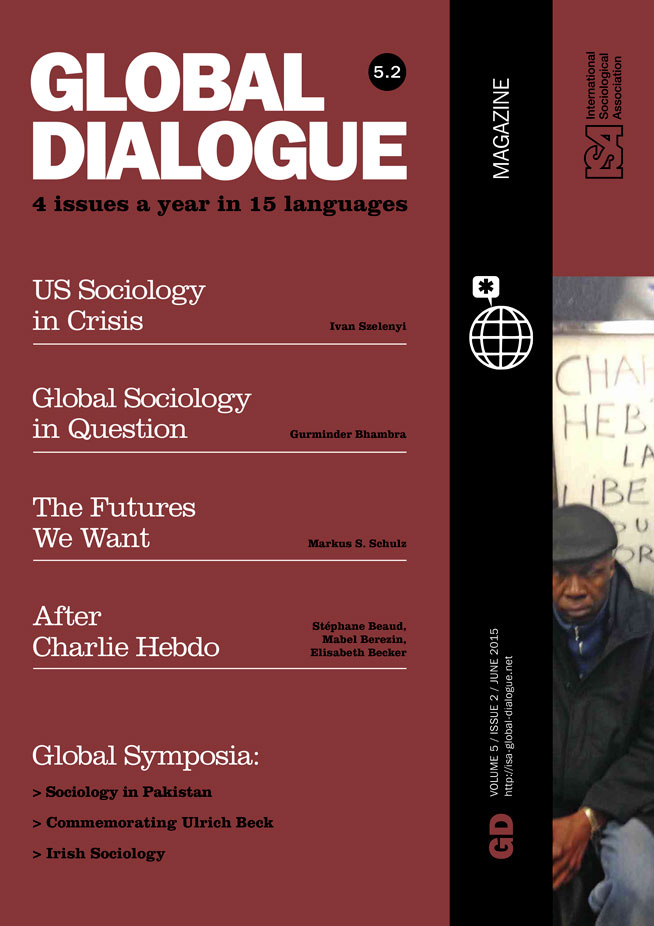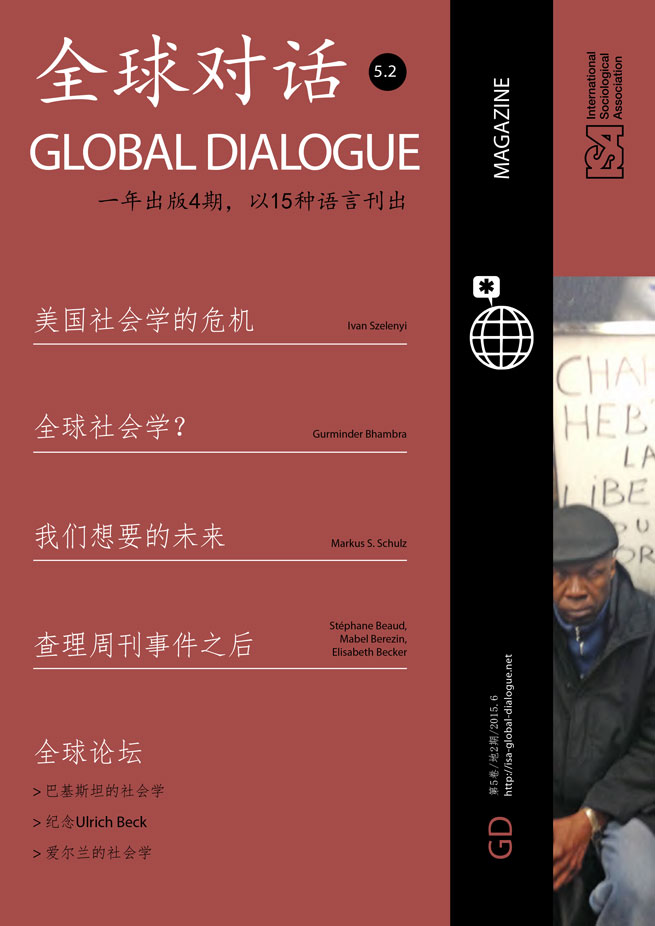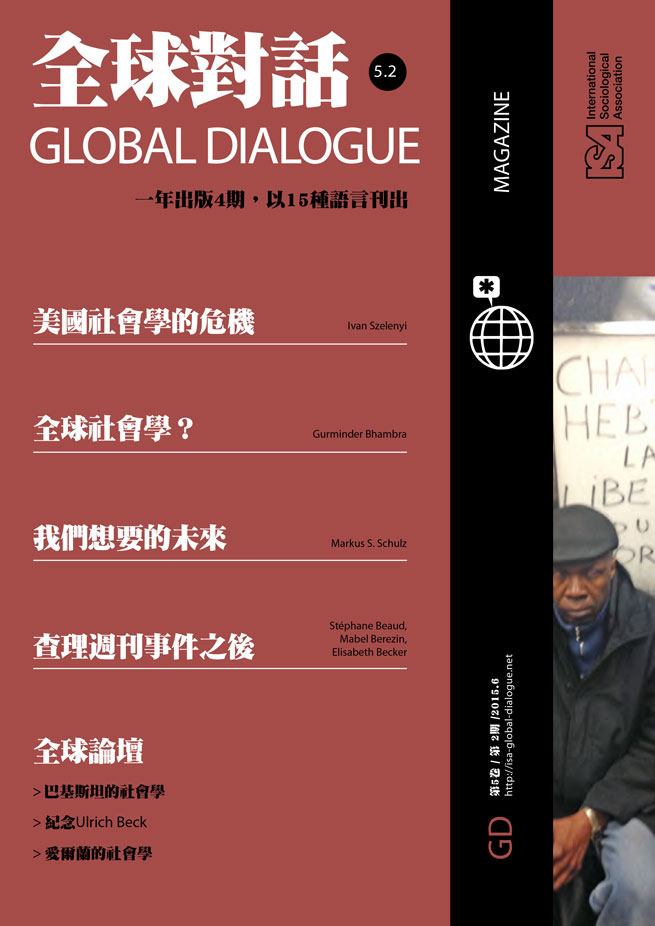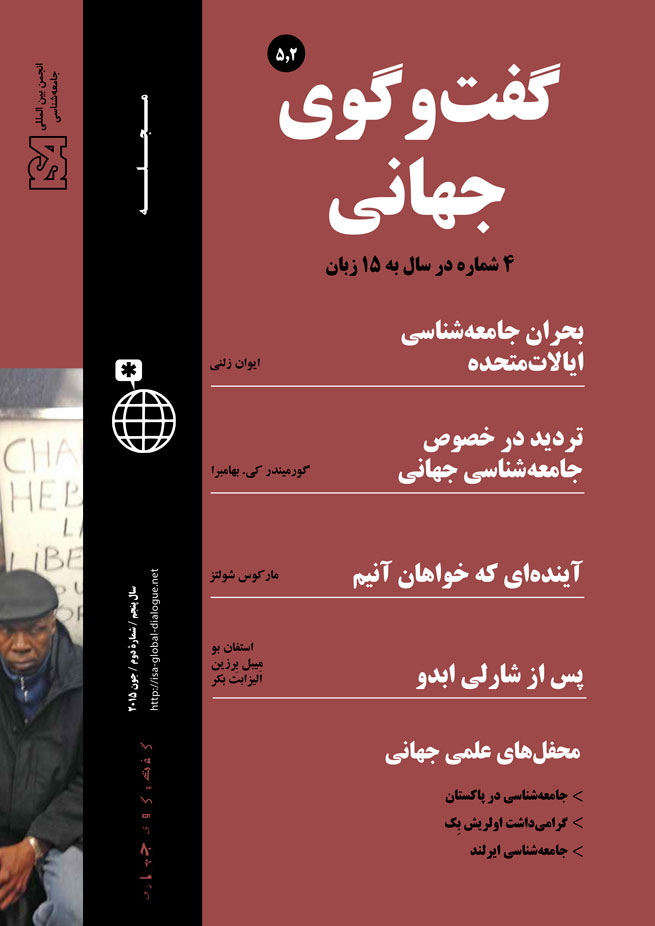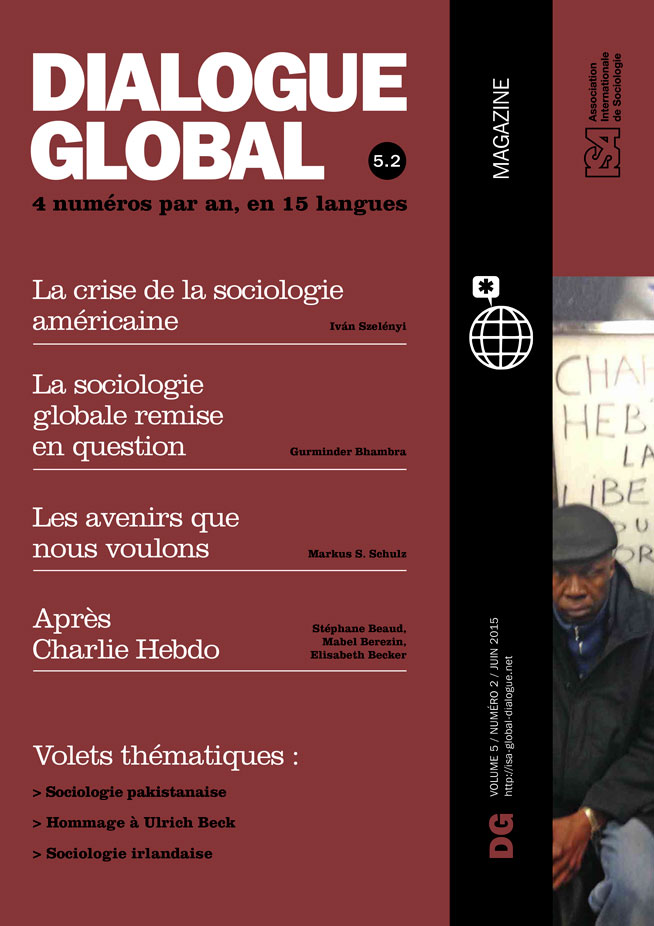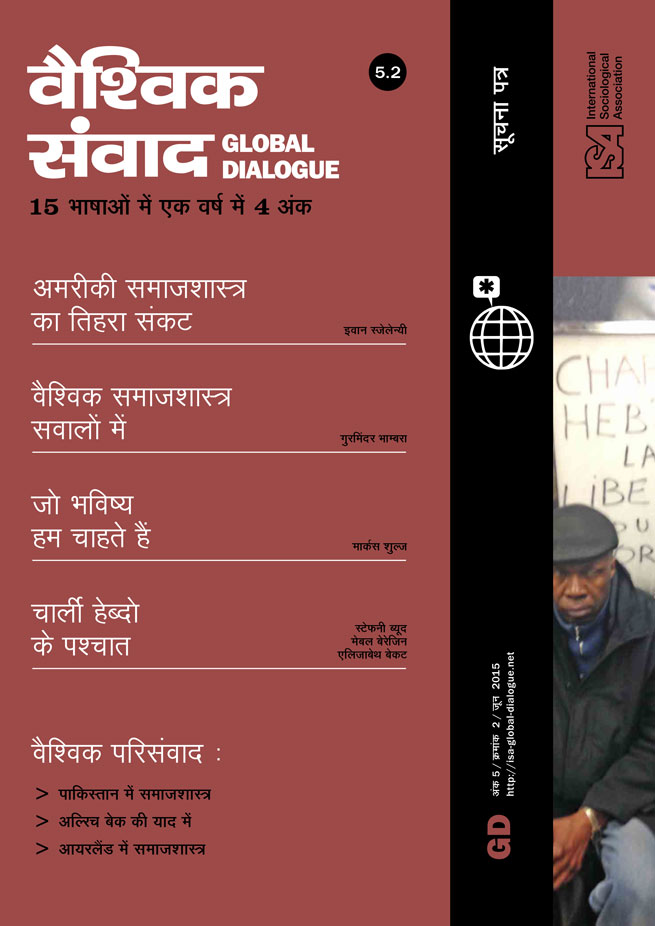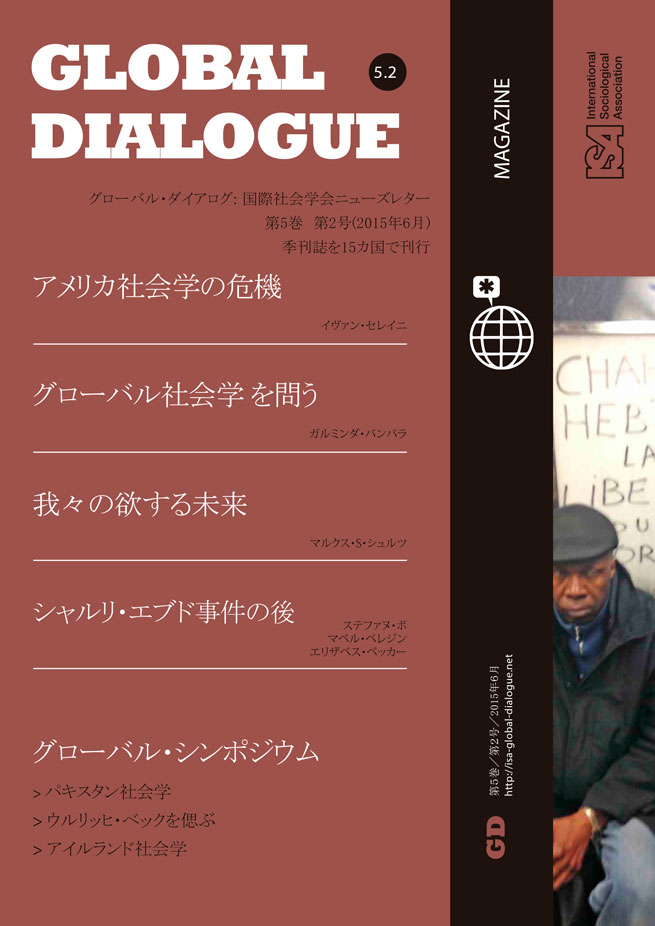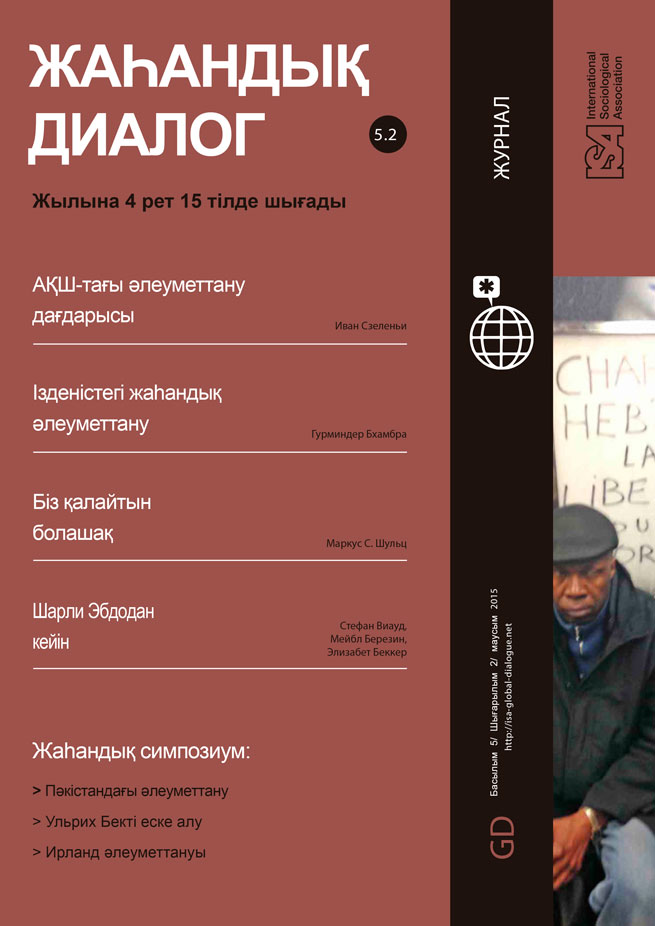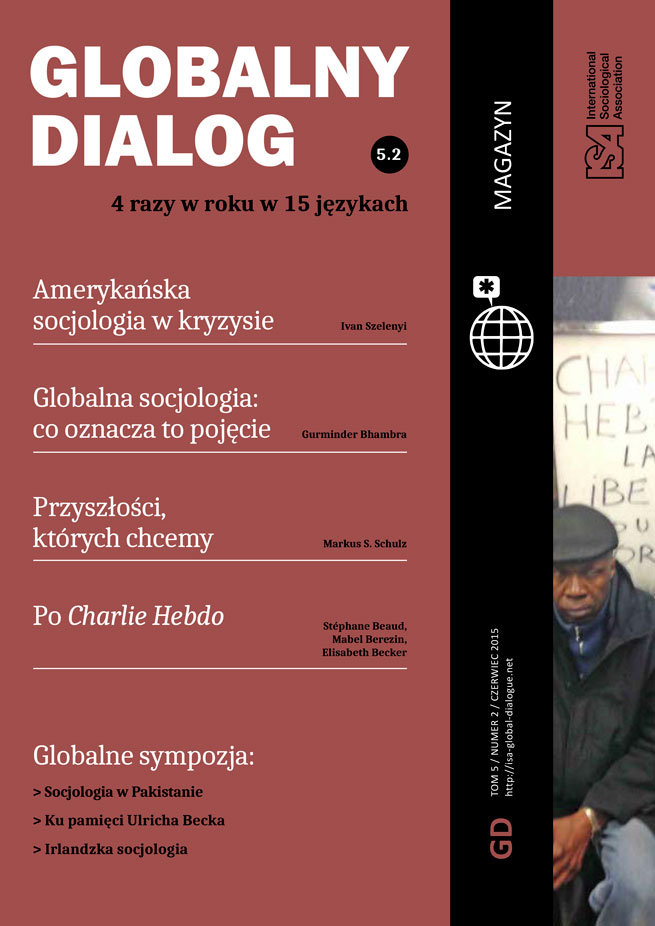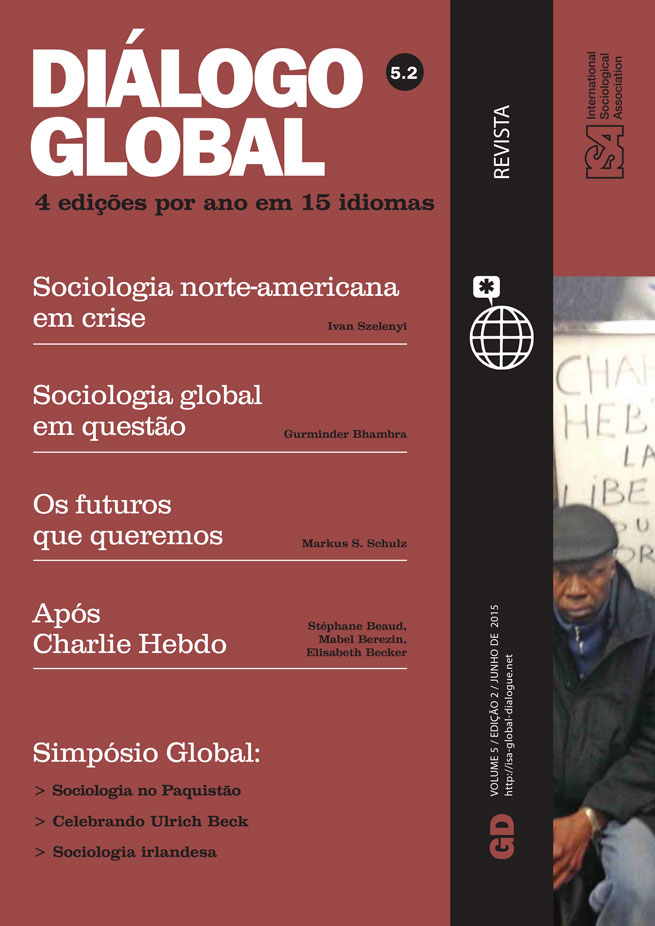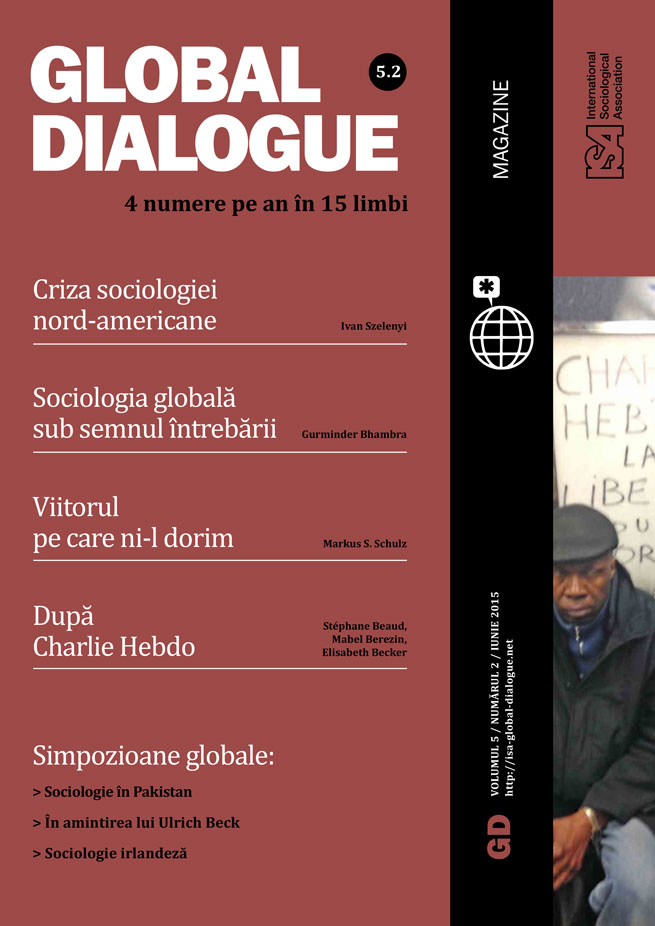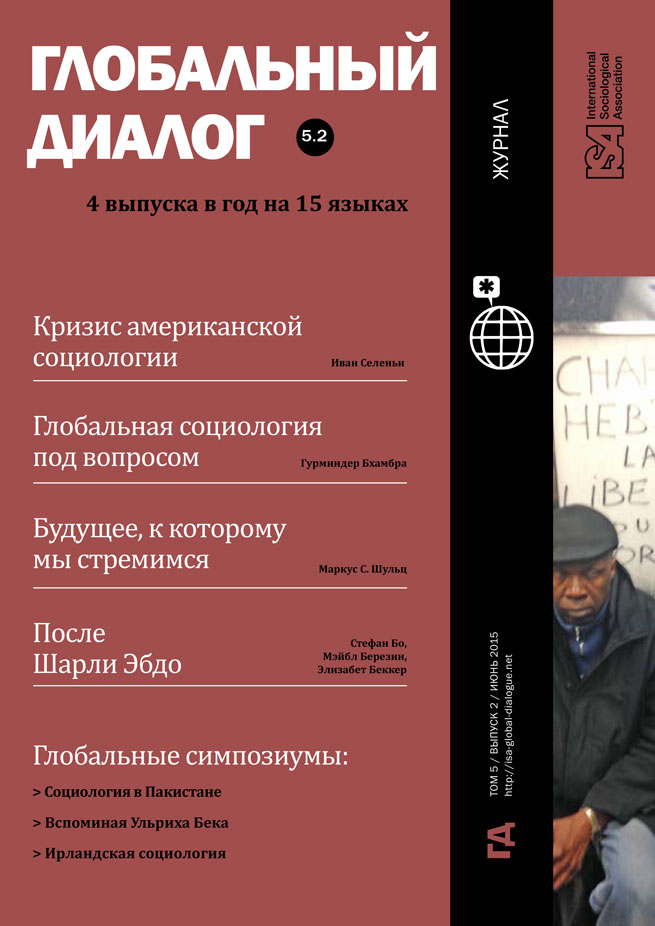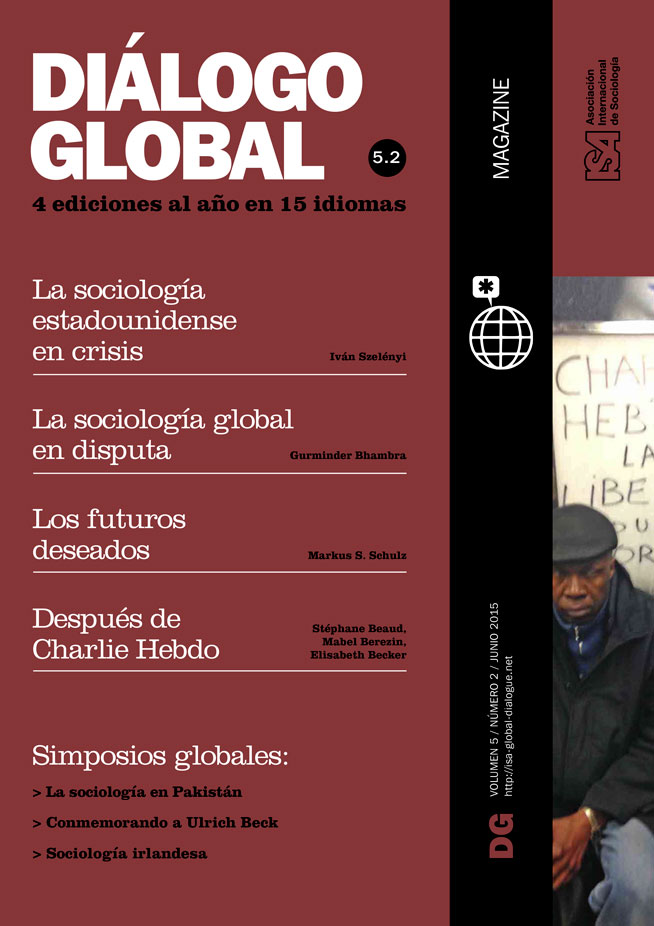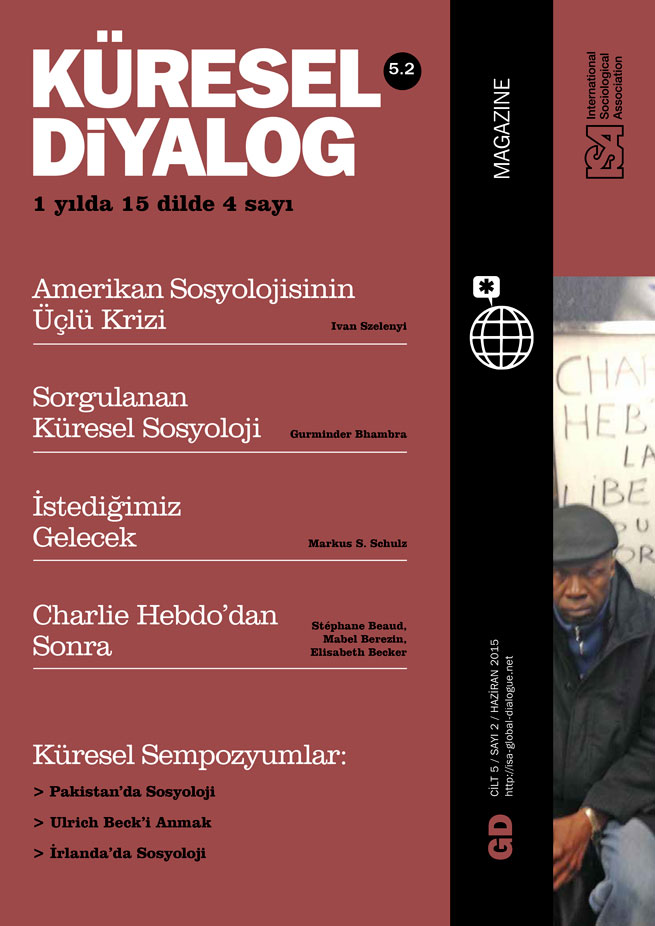Read more about The Future of Sociology, the Sociology of Future
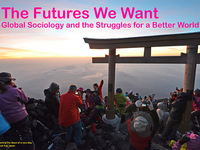
The Futures We Want
by Markus S. Schulz
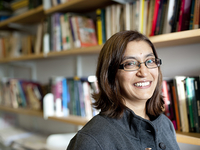
Global Sociology in Question
by Gurminder K. Bhambra
April 30, 2015
Ivan Szelenyi is a distinguished and decorated social scientist, bringing sociology to bear on the important questions of our time. He began his career in Hungary in the 1960s, working in the Hungarian Statistical Office and then in the Academy of Sciences until he was forced into exile as a result of his critical works, most notably, the book he wrote with George Konrad, Intellectuals on the Road to Class Power (1979) – one of the most significant and original treatises on state socialism to come out of Eastern Europe. He moved to Australia where he founded the department of sociology at Flinders University, and from Australia he moved to the US where he held distinguished professorships at the University of Wisconsin-Madison, the Graduate Center at the City University of New York, the University of California, Los Angeles and then Yale University. Most recently he became founding Dean of the Social Sciences at New York University’s Abu Dhabi Campus. His research into the redistributive effects of markets under state socialism and his study of the trajectory of socialist entrepreneurs remain, to this day, path-breaking. He is one of the few social scientists to have grappled with the transition from state socialism to capitalism combining historical and comparative analysis, authoring with his students Gil Eyal and Eleanor Townsley, Making Capitalism without Capitalists (1998). He has published research on both the wealthiest elites and the most excluded populations in post-communist Hungary. He is much loved and revered by his many students scattered all over the world, and is famous for his lectures on the history of social theory. There are few in a better position to assess the fate of US sociology – from a standpoint both within and without.
In The Coming Crisis of Western Sociology, 45 years ago, Alvin Gouldner predicted the fall of Parsonsian structural-functionalism and the rise of a more reflexive sociology – a warning that now seems oddly misplaced, since by 1970 Parsonsian sociology was dead and sociology was entering its most exciting epoch. Along with Gouldner, sociologists like Seymour Martin Lipset, C. Wright Mills, S.M. Miller, Lee Rainwater, Pierre Bourdieu, David Lockwood, Ralph Miliband, Claus Offe, Ralf Dahrendorf – along with others from then-socialist Eastern Europe, including Zygmunt Bauman, Leszek Kolakowski, and the Praxis group in Yugoslavia – were offering a refreshingly new critical sociology. Ironically, the crisis Gouldner predicted seemed to have been resolved: the discipline was finding its way out of structural-functionalism’s dead-end street, blossoming instead into a Mecca for radical – and very smart – students. Once a boring list of impenetrable, empirically untestable concepts, introductory sociology courses became an exciting terrain of political mobilization and intellectual contestation.
But today, Gouldner’s long-ago prediction seems prescient: the social sciences have undergone fundamental changes. Neo-classical economics, rational choice theory and experimental research design appear victorious; sociologists are still searching for a response. Students, now more conservative and worried about careers and pension funds, have lost interest in radical theories. Sociology departments struggle to attract enough majors to justify the size of the faculty, often offering “sexy” (and often not very demanding) courses just to raise enrollments[1] .
Our discipline appears to face a triple crisis. First, sociology has lost its political appeal (and its radical mission). Second, it has not yet found an appropriate response to the methodological challenge from economics or from rational choice political science. And third, sociology appears utterly confused as to whether it has a common theoretical core (the “great books” with which every sociologist should be familiar), or whether such a core is even desirable.
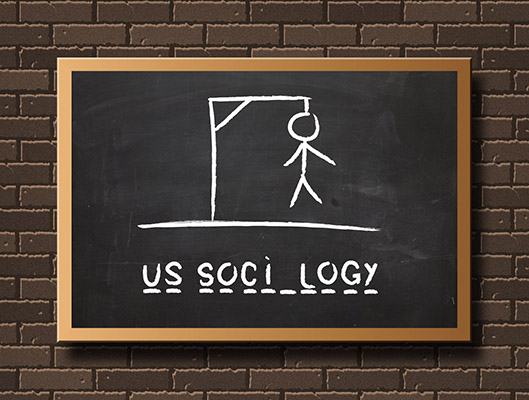
The Political Crisis
Forty years ago, sociology was the discipline which attracted radically minded young faculty and students. It was the “thing to do” if someone was interested in radical reform, or even revolution. In the late 1960s or early 1970s, sociology faculty (especially the older ones) tended to be conservative, but their students were left-wing radicals.
Today the situation is the opposite: we still have radical faculty, but our students tend to be “young Republicans.” And if you are a Republican, why on earth would you major in sociology rather than economics or rational choice political science? Suddenly our problem is not that we cannot find enough seats, but that we cannot fill our lecture halls. This is what I call our “political crisis,” which cuts both ways: we cannot attract students in sufficient numbers, and sociology is less and less likely to offer scenarios for radical social reform.
The Methodological Crisis
But sociology’s crisis also reflects a “methodological revolution.” Like Auguste Comte, who insisted the “science of society” must involve the same methodological rigor as “scientists” studying nature, social scientists have long sought to justify the “science” in their disciplines’ labels, by establishing “causal relationships” between “variables.”
Can those who study social (and economic) phenomena make believable claims about causality? Max Weber, suspecting that we cannot, opted for “interpretative social sciences.” While sociology has had astonishing success with survey research based on random sampling – predicting the outcomes of elections with samples of a few hundred for populations of hundreds of millions – this success did not get us an inch closer to testing hypotheses about causality.
To test hypotheses about causality, one must be able to assign part of the population to an “experimental group,” which will be exposed to a certain stimulus (“treatment”), leaving the rest in a “control group” isolated from such a stimulus.
In contrast to experiments, survey research invariably suffers from the “selection problem,” unable to tell with any scientific rigor whether the outcome in population A is different from population B because A was already different, or because it received a different “treatment.” A simple example: we know that people who are married live longer. But how can we tell whether they live longer because they were married, or whether healthier people are more likely to marry (and would have lived longer anyway)? If I could assign some fourteen-year-olds to an experimental group who will marry, and others to a control group who can never marry, revisiting all their health condition years later, I could offer a rigorous scientific answer to the question of causality – but such random assignment is of course impossible.
Social researchers have tried to dig themselves out of this hole. Some have tried to identify “causal mechanisms,” writing a “narrative” suggesting x may cause y (for example, that married people drink less and eat more regularly, hence living longer). This is a noble effort – I have tried it a number of times in my own research – but it is not very persuasive for “normal scientists.” Survey researchers have tried other technologies, but neither panel studies nor life history interviews resolve the fundamental problem; panel studies invariably lose population over time, and life history studies often suffer from subjects’ selective memories.
Some economists and political scientists have turned to lab experiments. Lab experiments with completely controlled environments offer a great solution in terms of random assignment, but at an incredible cost: external validity, that is whether the results are valid outside the experimental situation. Lab experiments always fall short on random selection: we cannot generalize from the findings of lab experiments, where the subjects usually are middle-class college students. (Another “solution” lies in so-called “field experiment” where random selection can be applied, but these rarely involve random assignment.)
Nevertheless, economics and political science offer a logically coherent (though as I elaborate below, empirically problematic) solution to the causality problem. Sociology, however, is on the defensive. Hence it finds itself in a methodological crisis.
The Theoretical Crisis
Sociology is not in much better shape theoretically; it has arguably been on a downward slope since the 1980s. I am certainly not nostalgic for the Merton-Parsons kind of unified theoretical orthodoxy; structural-functionalism was replaced by what I view as a healthy theoretical dialogue, mainly dominated by the Marx-Weber debate but leaving room for alternatives, including symbolic interactionism and ethnomethodology.
I have to confess that even in the golden days of the 1960s or 1970s, sociology faculty often fought over which authors should be included in required sociological theory courses. Today there is even less agreement – especially as, in a desperate attempt to retain a constituency, sociology tries to appeal to interdisciplinary programs such as women studies, African-American studies, Asian-American studies, Chicano studies, cultural studies, etc. These are all legitimate fields of instruction and scholarly inquiry, but including them in sociology blurs disciplinary boundaries.
The comparison with economics and political science is instructive. Economists seem to generally agree on the theoretical bases of their discipline. Almost all the economists I know have a common understanding as to why students take Principles of Microeconomics and Principles of Macroeconomics, before moving on to more advanced courses. There is little disagreement as to what should be taught in these courses; the syllabi are so standardized that any economist with a doctorate can teach any of those courses – though it is important to note the astonishing neglect of “classical” theorists, which means that students rarely confront long-standing controversies. Classic theoretical controversies may yet come back to haunt the discipline – as Keynes and Marx did during the 2008-9 global fiscal crisis.
In contrast, however, most sociology departments either cannot agree what an introductory course should be (instead offering a range of electives with strikingly different theories and epistemologies), or they offer an introductory course that is rather like a fruit salad, mixing sexy topics with a boring telephone directory of “basic concepts.” Is economics doing it the right way, or is sociology solving the problem of “introduction” to the discipline more reasonably? I will come back to this question in the last section of this article, but it seems clear that while introductory courses in economics establish a disciplinary consensus, sociology appears on the verge of chaos.
Even more troubling: as we disagree on the “classics” of our field, we become less certain about the questions our discipline should pose. Sociologists once were in rough agreement over which problems they “owned”: inequalities (in power, income and life-chances, by class, race and gender), educational and occupational attainment, social mobility. Now, however, we not only find it difficult to identify our research questions, but – much to our embarrassment – economists and political scientists appropriate what used to be our turf. Is it not painful that the most important recent books on social inequality were written by economists, like Thomas Piketty and Joseph Stiglitz? Have we been left behind?
A Way Out of the Crisis?
Let me conclude this rather pessimistic message by revisiting the virtues and strengths of the sociological approach to social reality, and by warning my colleagues to be careful about imitating new trends in economics and political science.
The strength of the sociological approach was reflexivity. A long tradition of sociology – from Karl Marx (“The ideas of ruling class are in every epoch the ruling ideas”) and Karl Mannheim (“… opinions, statements, propositions and systems of ideas are interpreted in the life situation of the ones who express them”) to Alvin Gouldner (The Future of Intellectuals and the Rise of the New Class) – asks who the speaker is, and what the (political) role of the sociologist is. As long as sociologists look for the “voice of the voiceless,” they will find their constituency.
True, students became more conservative, but after 2008-9 there has been increased discontent with the inequalities of global capitalism. As sociology returns to the concerns of the majority – class, racial and gender inequality, power, poverty, oppression, exploitation, prejudice – the good old days when students were sitting in the steps rather than leaving empty chairs in lecture halls may return. Michael Burawoy’s call for “public sociology” is a cautious call for this – and, notably, Berkeley’s sociology department is doing quite well, with full classrooms and high-quality graduate students. If sociology retains its political mission it could recapture from economics the investigation of big social issues, as well as the critical vision that was so characteristic of the classical sociology of Marx or Weber.
Many of our colleagues try to resolve the methodological crisis of our discipline by turning sociology into a “normal science” much like economics or rational choice political science, modeling behavior (relying on lab experiments) rather than trying to describe reality with as much precision as possible. But as I pointed out, while lab experiments allow us to test causal hypotheses, their fatal problem with external validity may explain why so many “scientific predictions” of neo-classical economics have, in fact, proven false.
In a faculty seminar at New York University, Abu Dhabi, my dear colleague Gilles Saint-Paul from the Paris School of Economics once asked, is economics a science? His answer was persuasive: how could it be when it uses poor-quality data, and models which cannot be falsified? Gilles suggested, instead, that economics is a “cultural activity,” which frames the terms of debate rather than offering falsifiable predictions.
I confess I find the question “why” more rewarding than “how,” and I have difficulty accepting anything which is not falsifiable as good social research. But like Weber, who termed objectivity “objectivity,” I tend to describe social sciences as “sciences.” None of social sciences are “sciences,” if science means a body of proposals where causal relationships can be tested. Social action is “voluntaristic” in the Hobbesian or Parsonsian sense, assuming an “agent” who can make choices (though within given circumstances). As Marx so astutely observed, “men make their own history but [under circumstances] transmitted from the past.” People make choices, and these choices are only in a stochastic and not in a deterministic relationship with their existence. Weber was right: we can interpret what people do, but we can never tell which of their actions are “rational,” nor can we predict what rationally they can or will do.
In this respect interpretative sociology is ahead of rational choice economics (or political science), and sociologists make a mistake in trying to imitate their more “scientific” colleagues in economics or political science.
Sociology has one further advantage over other “social sciences”: sociologists tend to use a critical reflexivity about data. This is often even more true of qualitative researchers than of “quantitative scholars.” Ethnographers educated by Howard Becker knew it best: one has to “immerse” oneself in social conditions before one can know what the right questions are. Careful ethnographers – and, of course, some survey researchers – demonstrate how much care is required to capture social reality.
Sociology is better off if it accepts its identity as a “science” rather than Science properly speaking. Yes, we should ask “why,” but remain skeptical as to how good our answer to this question will be. In this respect, economics and political science would be better off if they would learn some modesty from sociology.
So what is the bottom line? Sociology is indeed in a triple crisis. It responds the wrong way to the “scientific” challenge coming from neo-classical economics and rational choice political science. It either imitates them or moves into “trendy” or “sexy” interdisciplinary fields just to regain a lost constituency.
Instead, I suggest we return to the classical tradition of Marx and Weber, to a time when sociology confronted BIG issues. Neo-classical economics and rational choice political science may pretend to be science, but it would be as foolish for sociology to try to become another “normal science” as to abandon rigor to become the politically correct narrative. Instead, why not return to the classical tradition, when sociology asked the great questions and, in its reflexive, interpretative mode, mounted a serious challenge to economics (and the then-nascent political sciences)? Why not a left-leaning, critical neo-classical sociology?
[1] All commentators agree there was a jump in sociology enrollments and majors between 1965 and 1975 and a sharp decline during the 1980s. (See David Fabianic, “Declining Enrollments of Sociology Majors,” The American Sociologist, Spring 1991: Bronwen Lichtenstein, “Is US Sociology in Decline?” Global Dialogue 3.2, and http://www.asanet.org/research/stats/degrees/degrees_level.cfm). While the number of BA/BSc degrees awarded increased steadily since the lows of the 1980s, sociology enrollments and BA awards are still behind their peak of the mid-1970s.
Ivan Szelenyi, New York University, USA <ivan.szelenyi@nyu.edu>
This issue is not available yet in this language.
Request to be notified when the issue is available in your language.
If you prefer, you can access previous issues available in your language:

